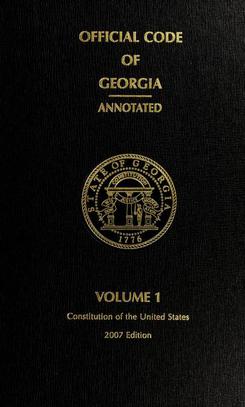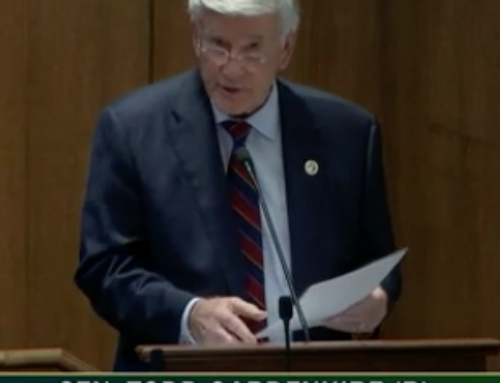The U.S. Supreme Court in a 5-4 decision on Monday ruled that non-binding legal materials created by a state legislative body cannot be copyrighted, expanding the understanding of what government works are in the public domain.

At issue in Georgia v. Public.Resource.Org, Inc. was whether Georgia could copyright the annotations in the Official Code of Georgia Annotated (OCGA) and prevent the nonprofit Public.Resource.Org from copying the annotated version and distributing it for free on its website.
“Under the government edicts doctrine, judges — and, we now confirm, legislators — may not be considered ‘authors’ of the works they produce in the course of their official duties as judges and legislators. That rule applies regardless of whether a given material carries the force of law. And it applies to the annotations here because they are authored by an arm of the legislature in the course of its official duties,” the court held in the majority opinion delivered by Chief Justice John Roberts Jr. and joined by justices Sonia Sontomayor, Elena Kagan, Neil Gorsuch and Brett Kavanaugh.
The government edicts doctrine is based on the principle that in a democracy, the people are the authors of the law. The Supreme Court recognized the doctrine in the 1800s when it ruled that judges cannot be considered “authors” under the Copyright Act of opinions they produce in their official capacity.
The Georgia case expanded the concept to lawmakers.
“The animating principle behind this rule is that no one can own the law,” Roberts wrote.
Copyright ruling could affect Tennessee
The decision could have an impact on 22 other states, including Tennessee, two territories and the District of Columbia, who have stated similar copyrights on annotated versions of their laws.
Tennessee had joined other states in arguing that removal of the copyright protection would reduce the availability of the law to the public by making it too expensive for states to produce and publish.
Currently, the Tennessee Code Commission contracts with Matthew Bender & Co., a division of LexisNexis Group, to publish Tennessee Code Annotated. This includes adding annotations to the statutes, such as relevant appellate decisions, Attorney General opinions and law review articles and other reference material. LexisNexis makes a free unannotated version available online, but sells the annotated version at a current price of $365.
Court: Annotations are significant to public

The Supreme Court rejected Georgia’s argument that the annotations beneath each statutory provision did not have the force of law and were not authoritative.
“[T]hat description undersells their practical significance,” the Court said. “Imagine a Georgia citizen interested in learning his legal rights and duties. If he reads the economy-class version of the Georgia Code available online, he will see laws requiring political candidates to pay hefty qualification fees (with no indigency exception), criminalizing broad categories of consensual sexual conduct, and exempting certain key evidence in criminal trials from standard evidentiary limitations—with no hint that important aspects of those laws have been held unconstitutional by the Georgia Supreme Court. See OCGA §§21–2–131, 16–6–2, 16–6–18, 16–15–9 (available at www.legis.ga.gov).
“Meanwhile, first-class readers with access to the annotations will be assured that these laws are, in crucial respects, unenforceable relics that the legislature has not bothered to narrow or repeal. See §§21–2–131, 16–6–2, 16–6–18, 16–15–9 (available at https://store.lexisnexis.com/products/official-code-of-georgia-annotated-skuSKU6647 for $412.00).
“If everything short of statutes and opinions were copyrightable, then States would be free to offer a whole range of premium legal works for those who can afford the extra benefit. A State could monetize its entire suite of legislative history. With today’s digital tools, States might even launch a subscription or pay-per-law service.”
Government edicts doctrine established in 1834
The Court relied on three cases from the 1800s to explain its position.
In the first case in 1834, the Court unanimously rejected in Wheaton v. Peters the argument that the “Reporter of Decisions” could assert a copyright interest in opinions written by the Supreme Court justices. In Banks v. Manchester (1888), the Court expanded the non-copyrightable concept to judge-made material involving opinions and explanatory materials prepared by the Ohio Supreme Court judges. That same year in a third case, however, the court limited the doctrine to exclude explanatory material developed solely by a government official who reported the decisions, reasoning he lacked authority to to make or interpret the law.
In Georgia, the Court reasoned that “[i]f judges, acting as judges, cannot be ‘authors’ because of their authority to make and interpret the law, it follows that legislators, acting as legislators, cannot be either.”
The Court found that Georgia’s Code Revision Commission fell within the government edicts doctrine in directing the annotations because it acted as an adjunct to the state legislature and were authors of the annotations in the course of its legislative responsibilities.
Thomas dissents, argues annotations lack legal force
Justice Clarence Thomas, joined by Justice Samuel Alito and partially by Justice Stephen Breyer, disagreed with the majority opinion and argued that “statutes and regulations cannot be copyrighted, but accompanying notes lacking legal force can be.”
He warned that “[t]he majority’s rule will leave in the lurch the many States, private parties and legal researchers who relied on the previously bright-line rule. Perhaps, to the detriment of all, many States will stop producing annotated codes altogether.”
He noted that Lexis sold Georgia’s annotated code for $404 in 2016, while West Publishing’s competing annotated code sold for $2,570. “Should state annotated codes disappear, those without means to pay the competitor’s significantly higher price tag will have a valuable research tool taken away from them.”
Justice Ruth Ginsberg also wrote a dissenting opinion, joined by Breyer. She argued that the annotations in the Official Code of Georgia Annotated could be copyrighted because they were not done in the legislative capacity as they were not part of the lawmaking process of the Georgia Legislature.
Georgia case drew several amicus briefs
The case drew several amicus briefs in support of Public.Resource.Org, a non-profit dedicated to facilitating public access to government records and legal materials. Organizations ranging from law librarians, media and journalisms groups, civil rights organization and constitutional scholars arguing that the copyright on state annotated codes hindered meaningful citizen access to the law.
For example, the American Library Association, Association of College and Research Libraries, and the American Association of Law Libraries, argued that the free versions of the code provided by Lexis were inadequate in providing citizens meaningful access to Georgia law. The Reporters Committee for Freedom of the Press and 25 news organizations argued that shielding portions of the OCGA with copyright protection burdens journalism and harms the public interest.
The ACLU made arguments that the First Amendment limits what the copyright law can prohibit speakers from reproducing or redistributing, and the government edicts doctrine serves to protect those First Amendment rights.
Tennessee Coalition for Open Government, in an amici curiae prepared by the Stanton Foundation First Amendment Clinic of Vanderbilt Law School in support of Public.Resource.Org, argued that open access to the law is essential for an informed citizenry.
Excerpt from TCOG brief:
“By imposing financial barriers to accessing its official Code, Georgia diminishes the ability of its citizens to access the authority that governs them…
“The First Amendment’s Free Speech Clause exists in part to protect the right of citizens to engage in informed discussion regarding their government, so that citizens may govern themselves and participate in democracy. Toward that end the First Amendment guarantees the right of citizens to access government information necessary for informed self-governance. A state’s official annotated code constitutes such information, but efforts to impede access to the official annotated code frustrate the goals of the Free Speech Clause.”


